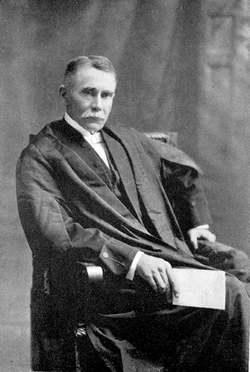THE DONNELLY TRIAL.
 The trial of James Carroll for the murder of Judith Donnelly, was brought to a close on Saturday last, at 4.30 p.m. During the trial there was but little evidence forthcoming which was not given at the preliminary trial of the prisoners. The Judge's charge to the Jury, which we give is a careful recapitulation of the evidences given, and as it will be seen, his Lordship charged rather against than in favor of the prisoners. After the Jury had been confined from 4.30 till 10.30, it was found that seven were for acquittal, four for conviction and one undecided. There being no possibility of agreement, the Jury was discharged.
The trial of James Carroll for the murder of Judith Donnelly, was brought to a close on Saturday last, at 4.30 p.m. During the trial there was but little evidence forthcoming which was not given at the preliminary trial of the prisoners. The Judge's charge to the Jury, which we give is a careful recapitulation of the evidences given, and as it will be seen, his Lordship charged rather against than in favor of the prisoners. After the Jury had been confined from 4.30 till 10.30, it was found that seven were for acquittal, four for conviction and one undecided. There being no possibility of agreement, the Jury was discharged.
THE JUDGE'S ADDRESS.
Judith Donnelly came to her death by human hands on the night of February 3rd, and having determined that they had to consider by whose hands the murder was affected. The responsibilities in making an enquiry of this kind, were of course great, but they had to be fulfilled honestly and impartially, but rigidly, sternly, and manfully. If there was a reasonable doubt, then the doubt in a case of this kind should be given in favor of the accused. The doubt, however, should not be a doubt conjured up by what may have happened in other cases or by reports regarding the case produced before the evidence was given. In the same way the evidence given as to character in a case of this kind might become of no importance whatever, unless the other evidence were of such a class as to make it completely impossible to say whether the accused was guilty or not, and in such a case previous good character would give a clue as to whether the prisoner really could be guilty of such a crime or not. If this proof of guilt was convincing, their evidence as to character was of no consequence at all. The jury no doubt would agree that the Donnelly's came to their deaths by violence, and by an outrage unparalled in this country for savage atrocity and brutal ferocity. The reflection that such a crime could be committed in this Christian and civilized country was sufficient to make one's blood freeze; but though horrified at the brutality of the crime, it would not be right for the jury to allow themselves to consider the evidence brought against the prisoners charged with the offence in any other than an impartial spirit. The deaths which were caused that night were as nothing to the vindication of public justice, which was now required in order to show that such deeds could not be permitted in this country. If this offence was the work if the vigilance committee, and it passed unpunished, who could tell what next offence would be committed? If this offence remained unnoticed what guarantee was there that others who had become obnoxious to the persons who formed this conspiracy against law and order, would not be exterminated? If the perpetrators of this deed went free, what satisfaction would the public have that in other parts of the country evil disposed people would not take the lives of their fellowmen?
[...] His Lordship, who had spoken for over two hours, ordered the jury to be removed.
The Jury went out at 4.30.
At nine o'clock his Lordship came into Court and said: — The jury have sent a message to say that they cannot agree, and are not likely to agree. In a case of this kind, if their is no chance of their conscientiously coming to an agreement, I would not be inclined to keep them there to convince any one of them who conscientiously may have a view one way or the other. However, they had better take a little more time to consider.
At half-past ten the jury were called in. In reply to the clerk, the foreman, Jas. Douglas, said it was impossible for them to agree. Seven were for acquittal, four for conviction and one juror was entirely undecided.
His Lordship said that was no verdict, and asked if there was any chance of an agreement.
Mr. Douglas — Not the least.
His Lordship — Is there any point upon which you desire instruction?
Mr. Douglas — No, sir, not so far as I know.
His Lordship said he did not care to lock the jury until Monday with a view to coercing them into a decision. He would therefore discharge them.
The court then rose.
